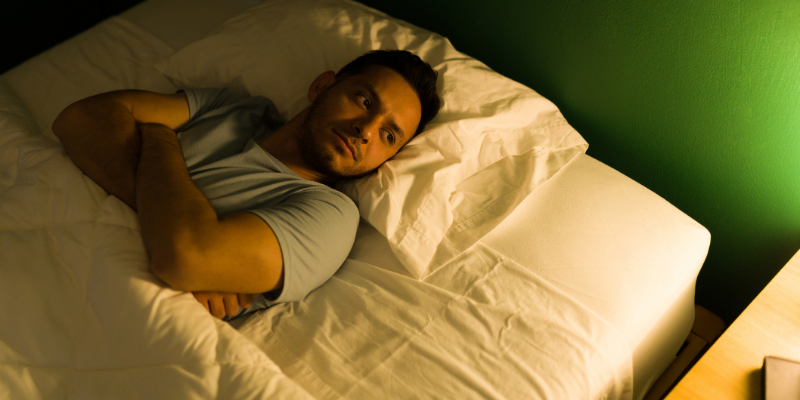You’re exhausted. You’ve been looking forward to getting into bed all day. But when the lights go out and the world quiets down… your mind does the opposite. It speeds up.
If you’re lying in bed at night wondering, “Why can’t I sleep even when I’m tired?” — you’re not alone. This is more than just a bad night. It’s a message from your nervous system.
The Most Common Causes of Nighttime Restlessness
There are many reasons why you might struggle to sleep at night, and they usually fall into one of three areas: physical, emotional, or environmental.
- Biological Factors: Your natural sleep rhythm (circadian rhythm) might be disrupted due to irregular sleep times, jet lag, or hormonal changes.
- Environmental Triggers: Light exposure, screen time before bed, background noise, or room temperature can make it harder for your body to enter a restful state.
- Emotional & Cognitive Load: The most common cause — especially for people who feel tired but can’t sleep — is mental overactivity. Stress, anxiety, unresolved emotions, or racing thoughts can prevent the nervous system from calming down.
Sleep isn’t a simple switch. If your mind doesn’t feel safe, your body often won’t rest — no matter how exhausted you are.



The Difference Between Insomnia and Anxiety at Night
It’s easy to confuse insomnia and nighttime anxiety — both can leave you lying awake, exhausted but unable to sleep. But understanding the difference is essential if you want to find the right solution.
- Insomnia is typically a clinical sleep disorder. It often involves difficulty falling or staying asleep, even when the environment is ideal.
- Nighttime anxiety, on the other hand, is rooted in emotional or psychological triggers — racing thoughts, fear about the next day, or unresolved tension that spikes in silence.
Key signs it may be anxiety rather than classic insomnia:
- Your mind replays conversations or imagined future scenarios
- You feel physically alert (tight chest, racing heart) despite being tired
- You experience an underlying sense of dread or urgency
If your thoughts are loud, intrusive, and emotional in tone — it’s likely anxiety. And that means sleep strategies alone won’t be enough. You may need emotional support, stress regulation techniques, or therapeutic intervention.
What to Avoid Before Bed (That You Probably Do Daily)
Most people think falling asleep is all about what you do in bed. But what happens before you lie down matters just as much — sometimes more.
Here are the habits you might be doing every night that sabotage your sleep:
- Endless scrolling (aka doomscrolling): Scrolling through TikTok or Instagram activates your brain’s alert system. Social media isn’t just distracting — it fuels comparison, anxiety, and FOMO, all of which increase cortisol (your stress hormone).
- Caffeine after 2 p.m.: That iced coffee or green tea might seem harmless, but caffeine can stay in your system for 6–10 hours. Even if you fall asleep, it can reduce deep sleep quality — leaving you groggy the next morning.
- Working in bed or checking emails: Your brain starts associating your bed with performance, not rest. This creates “alert brain” mode in a space meant for recovery.
- Trying too hard to sleep: The more you try to fall asleep, the more performance anxiety builds. This backfires by making your body feel like it’s under pressure.
Sleep-Friendly Alternatives (That Actually Help)
Instead of forcing sleep, try shifting your nighttime routine toward regulation:
- Swap scrolling for a calming routine: try gentle stretching, journaling, or reading fiction (no screens).
- Replace caffeine with chamomile, magnesium, or warm oat milk.
- Set a wind-down alarm 60 minutes before bed — not to sleep, but to disconnect.
• • Remind yourself: “My job isn’t to sleep. It’s to rest. My body knows what to do.”
How to Calm Your Mind and Body When It Won’t Shut Down
You’ve turned off the lights, but your thoughts are still on full volume.
This isn’t about “quick fixes.” It’s about teaching your nervous system that it’s safe to rest — even when the day hasn’t felt that way.
1. Worry Dumping — Turn Thoughts Into Objects
Before bed, grab a notebook (yes, paper — not your phone). Set a 5-minute timer. Write everything your mind wants to say — no filter, no structure.
Your brain doesn’t need solutions right now. It just needs to be heard.
This helps externalize your thoughts so they stop circling inside your head like a loop.
2. Progressive Muscle Relaxation — Release What You Hold
Start from your toes and move up: tense each muscle group for 5 seconds, then release. Feel the difference between tension and letting go.
When your body lets go, your mind often follows.
This technique is used by therapists and athletes alike to guide the nervous system into a parasympathetic (rest-and-digest) state.
3. Soundscapes — Give Your Brain a Safe Anchor
Try a slow, repetitive audio pattern: ocean waves, brown noise, soft instrumental loops.
Repetitive sounds offer predictability — something anxiety-brains crave at night.
Don’t use music with lyrics. Your brain will treat it like a story — and stories keep you awake.
4. Compassionate Self-Talk — Speak to Yourself Like Someone You Love
Replace internal pressure with gentleness.
Instead of: “I need to fall asleep now or I’ll be useless tomorrow.”
Try: “I’m allowed to be awake. My body’s just trying to protect me from something it doesn’t fully understand yet.”
This shift lowers internal resistance, allowing rest to happen organically.

Still Wide Awake? You Might Not Need Another Sleep Hack — You Might Need Support.
If these nights are more than occasional… your body could be asking for emotional resolution, not melatonin.
At Metime Healing, our therapists don’t just help you “sleep better” — we help you quiet what’s keeping you up.
You’re not broken. You’re overwhelmed. And you don’t have to carry it alone anymore.




